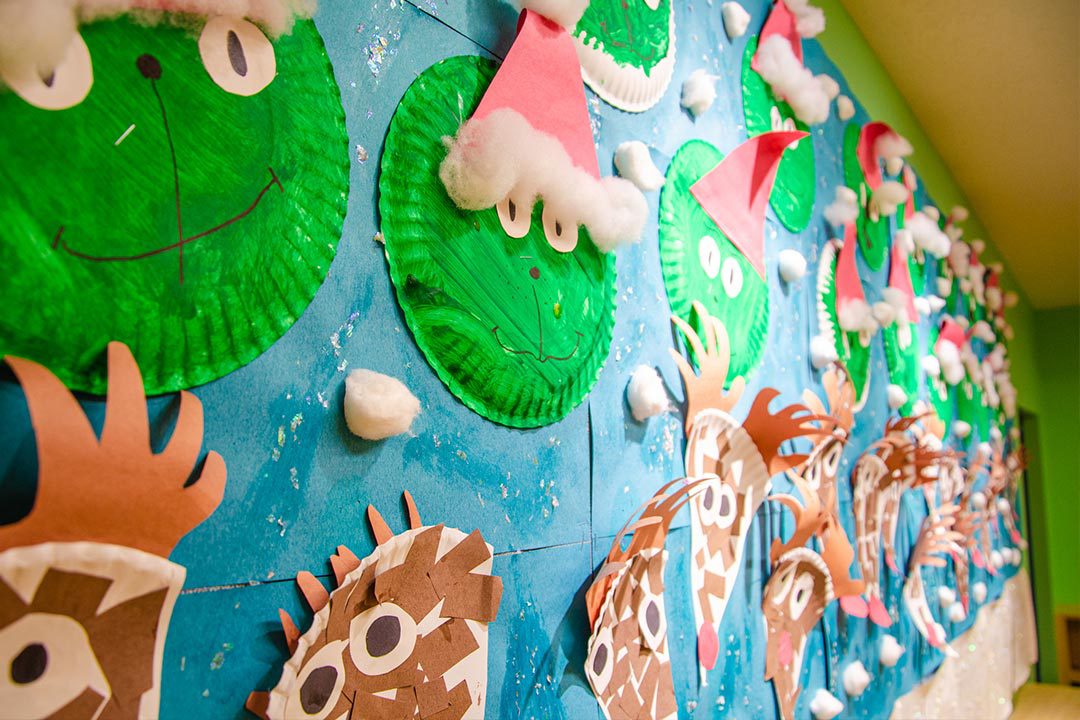The transition from home to daycare and back again can be a source of stress for children and parents alike.
As a child adapts to a structured daycare environment, parents may be concerned if they notice significant differences in behavior from one place to the other. While it is never comfortable watching your child act differently, it is also quite normal in most circumstances. Understanding and clear communication between parent, child, and Early Advantage teachers can ease your fears as your child adjusts to life outside the home.
Two Foundations: Behavior at Child Care Vs. Home
Time spent at home and Early Advantage Child Care are two bedrocks for Childhood formation.
These two environments can be very different as a child transitions from home to a more structured environment with new social experiences. Understanding the differences between the two can help in understanding why children’s behavior changes from one to the other.

The Comforts of Home: Understanding the Foundations of Behavior
Home, a haven of familiarity and comfort, plays a pivotal role in shaping a child’s behavior. It is within the walls of their home that a child’s individuality blossoms, influenced by the personalized attention provided by parents or guardians. The stability and predictability of the home environment contribute to a child’s sense of security, allowing them to express their emotions and experiment with different behaviors.
However, the term “home” transcends the physical space; it encapsulates the emotional warmth and connection that children associate with their family. The emotional bonds formed at home lay the foundation for a child’s understanding of love, care, and interpersonal relationships. This emotional backdrop significantly influences a child’s behavior, fostering healthy emotional development in a positive and secure environment. The move to our child care center can be a significant change for your child and their adaptation to the new experience may lead to different behaviors. Some children who are very behaved at home will struggle with acting out. Others who may act out at home and push a parent’s boundaries, may behave better.

Navigating the Social Melting Pot: Daycare Dynamics
Early Advantage introduces children to a dynamic social sphere, distinct from the familiarity of home. The structured routines, group activities, and diverse peer interactions at our center foster social development, cooperation, and conflict resolution. In this bustling environment, children learn to navigate social dynamics, adapt to communal living, and build relationships beyond the family unit.
The transition from home to daycare, however, can pose challenges for children. The need to adapt to new rules, expectations, and social norms can lead to behavioral changes. Peer influence, teacher guidance, and the sharing of attention may all contribute to changes in your child’s behavior. Understanding and addressing these challenges is crucial for a seamless transition between the home and daycare environments. The teachers at Early Advantage understand these challenges and implement ongoing communication with our families to ensure we’re always taking loving steps forward in the right direction.

Helping Your Child Transition from Home to Early Advantage
The successful transition from home to preschool requires a collaborative effort between parents, the child, and Early Advantage staff. Open lines of communication between your family and our staff will serve as the foundation for understanding and addressing any behavioral adjustments.
Parents play a pivotal role in creating a seamless transition for a child. Before the child starts daycare, parents can engage in age-appropriate conversations to prepare them for the new environment. Sharing insights about the daily routine, introducing their teacher, and emphasizing the positive aspects of the experience can help smooth out potential differences in behavior.
During the initial days at Early Advantage, consistent communication between parents and staff is essential. Daily check-ins, whether in person or through our parent portal, allow parents to stay informed about their child’s activities, behaviors, and any challenges they may be facing. This information loop enables parents to reinforce positive behaviors at home and provides insights into any adjustments that may be necessary to support the child’s emotional well-being.
For the child, communication is equally important. Parents can encourage their child to express their feelings about daycare, actively listening and validating their emotions. Creating a sense of agency empowers the child to communicate their needs to both parents and our staff. Simple practices like creating a goodbye routine or introducing a comfort item from home can provide a sense of continuity, aiding in the child’s behavioral adjustment and helping to ensure that the child feels comfortable while at daycare.
Early Advantage is here to help!
At Early Advantage, we care about your child’s development and want to do all we can to alleviate any anxiety you may have about your child’s differing behavior at daycare or at home.
Feel free to contact us. Together, we can guide your child through this wonderful, critical, but sometimes confusing developmental stage. In partnership with you, we can give your child the tools they need for success!

